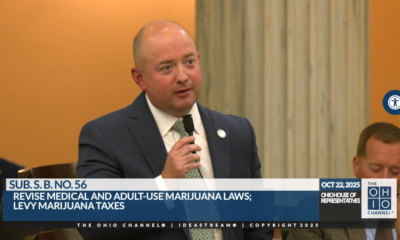The fog of the inauguration has cleared, and prospects for weed law reform look dim in Washington D.C. under the second Trump Administration.
But don’t get bummed—experts say voters have the power to dictate their fate at the level where it most impacts them: their city and state.
According to veterans of the country’s weed wars for decades, no executive order, DEA ruling, or Congressional bill is on tap to deliver the legalization that 70% of US voters want. But a series of state battles are brewing, where regular folks can defend and advance their freedoms.
“No one is coming to save us. There’s no hero here,” said cannabis investor Emily Paxhia, co-founder at Poseidon Investment Management. Paxhia is a veteran of the major reform group Marijuana Policy Project. “Every victory has been at the state level, and I think there’s still hope.”
Before we dive into the weed reform battles brewing in California, Ohio, Montana, Nebraska, and Texas, let’s run down prospects in the three branches of government: a distracted Executive; a hostile Legislative; and a wild card Judicial.
Conflicting White House priorities

Many experts don’t see legal weed as a priority at a Republican White House.
During the election, the famously straight-edge candidate said he supported Florida legalization Amendment 3, rescheduling, and a State’s Rights approach to pot policy. Since then—silence. Some take the President at his word, including the major lobbying group the US Cannabis Council.
“President Trump has clearly stated his position on cannabis reform. He supports rescheduling, banking access, and state-level legalization,” the USCC wrote to Leafly. “We have every expectation that he will follow through on his commitments, and we look forward to working with his administration to move our nation forward.”
Related
Cannabis predictions for 2025: Low prices, high taxes, and hash
Conversely, Paul Armentano—Deputy Director of America’s most notable reform group, the National Organization for the Reform of Marijuana Laws (NORML)—doubts the President will lift a finger for potheads.
“There is really nothing in Trump’s history that would lend one to believe that this is an issue that he wishes to prioritize.”
Paxhia said industry and experts have briefed the President, and he understands legal cannabis is about taxation and regulation, not underage use.
“He’s been very receptive, but the biggest question is where the priority lies for his new presidency.”
A dead end at HHS and DEA
President Biden’s bungling of rescheduling showed how the White House can’t just snap its fingers and take marijuana off the Controlled Substances Act. It requires the Drug Enforcement Administration or an act of Congress. The folks at both of those places are no friend to grass.
Shop highly rated dispensaries near you
Showing you dispensaries near
President Trump nominated pro-pot Robert F. Kennedy Jr. as Health and Human Services Secretary, but then RFK. Jr. promptly demurred to the DEA.
Moreover, President Trump then nominated a longtime drug warrior to run the DEA—Terry Cole. That’s bad news for those hoping the DEA would give rescheduling marijuana a fair hearing.
“Cannabis prohibition is in the DNA of the DEA. What are you going to do—strip it out?”
Emily Paxhia, co-founder, Poseidon Asset Management
Armentano said from years of experience that rescheduling is a catch-22: “There is no way you’re ever going to get a level playing field in that process.”
So legalizing administratively looks like a dead-end. What about Congress?
Congress: Dim and dimmer
Congressional Republicans promise to do less on weed law reform than the do-nothing Democrats that preceded them.
For example, former Senate majority leader Chuck Schumer never brought even a modest pot banking bill to the Senate floor. The first Republican pot bill this session would retain prohibition-era taxes on any cannabis business deemed legal.
Congress rewards seniority, and the shot-callers in both houses are veterans of prohibition, said Armentano.
“The older the lawmaker, the more wedded they are to the sort of war on drugs mentality of the 1980s.”
Paul Armentano, Deputy Director, NORML
The Supreme Court: Joker’s wild
One bright spot might turn out to be the judicial branch. The highest court in the land now envisions a less powerful federal government. That vision could net a win for state weed programs.
The Supreme Court has taken a more federalist turn after several Trump appointments. Specifically, the new conservative majority could narrow the reach of 1970’s Controlled Substances Act, and thus protect state-legal cannabis systems.
In particular, a pending case questions the application of the US Constitution’s inter-state Commerce Clause to quash intra-state weed commerce.
“This is an avenue that doesn’t get enough attention,” she said.
The real action: Back in the States
Cannabis fans can score real wins defending the weed rights they’ve already won and advancing new ones at the state level this year.
It’s an opportunity to hold your elected representatives accountable for real change. Take a look:
Protecting Montana
For example: Montanans must rally to protect legalization there. It’s under threat by a new bill to charge each recreational smoker $200 and make them register with the state. Another bill caps THC at 15% across the board—a giveaway to street dealers and the illicit market.
“They are really after us this time,” David Liberman, general manager at Lionheart Cannabis. Montana’s 100,000 or so cannabis consumers can get engaged here.
Tax equality for Californians

Californians can meet their representative Sacramento Lobby Day on March 24 to stop another tax hike. Cali weed smokers pay 150 times the taxes on a joint compared to a glass of wine, and 60 times more taxes than beer drinkers.
Defending Ohio, Nebraska, and South Dakota
Ohio, Nebraska, and South Dakota have legalized adult-use, or medical cannabis, but politicians didn’t get the memo. Supporters in each state will have to defend their voter-approved measures against Republican efforts to undo the people’s will.
Pennsylvania’s push
Furthermore, Pennsylvania’s Governor Josh Shapiro wants to enact majority-supported adult-use legalization there, but he’ll need voters to lean on their representatives.
“Legalizing adult-use cannabis will make Pennsylvania more competitive, bring in more money to help our communities, and create real opportunity for small businesses all across our Commonwealth,” he wrote Feb. 24.
Freedom to grow in Washington state
Talk about a bellwether: one of the nation’s oldest adult-use cannabis states—Washington—will still lock you up for growing a single weed plant. Will voters speak up to help pass House Bill 1449? Weigh in here.
Find your voice
With 41 medical states, and super-majority US support for legalization—no voter should fear raising the cannabis issue with their state representative, or state senator, said Armentano. There are about 34 million regular cannabis users in America. It’s high time elected officials heard from them.
For example, weed voters defeated an Ohio legalization attack in 2023 with 7,500 emails to legislators.
There are about 34 million regular cannabis users in America. It’s high time elected officials heard from them.
“We have seen when a lot of cannabis consumers push this issue, politicians will respond,” he said.
Even better, defeating many state freedoms often requires politicians to just skip or abstain from a committee vote. And politicians love to do nothing.
“Typically it’s easier to defeat legislation than it is to pass legislation,” Armentano said. “We have that home-field advantage in a lot of these instances.”
So don’t pout, doom scroll, or hold your breath for some savior. Lend your voice to stir up change that’ll percolate up from the states. Indeed, that’s how lasting change happens.



























































